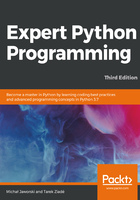
Changes in the standard library
Breaking changes in the standard library are the second easiest to catch after syntax changes. Each subsequent version of Python adds, deprecates, improves, or completely removes standard library modules. Such a process was also common in the older branches of Python (1.x and 2.x), so it does not come as a shock in Python 3. In most cases, depending on the module that was removed or reorganized (such as urlparse being moved to urllib.parse), it will raise exceptions on the import time just after it is interpreted. This makes such issues so easy to catch. In order to be sure that all such issues are covered, full test code coverage is essential. In some cases (for example, when using lazily loaded modules), the issues that are usually noticed at import time will not appear before some modules are used in code as function calls. This is why it is so important to make sure that every line of code is actually executed during tests suite.
A lazy loaded module is a module that is not loaded on import time. In Python, the import statements can be included inside functions, so an import will happen on function call and not on import time. In some cases, such loading of modules may be a reasonable choice, but in most cases, it is a workaround for poorly designed module structure (for example, to avoid circular imports). It is considered bad code smell and should be generally avoided. There is no justifiable reason to lazily load standard library modules. In well-structured code, all imports should be grouped at the top of module.